
In today’s fast-paced work environment, having a reliable document management tool is essential for seamless collaboration. While Coda has been a popular choice for teams looking to integrate documents, spreadsheets, and databases, it may not be the perfect fit for everyone. Whether you need more customization, better security, or enhanced integrations, there are plenty of alternatives available. In this article, we’ll explore the top Coda alternatives, including FuseBase, SharePoint and other tools that offer powerful document management and team collaboration features.
What is Coda?
Coda is a collaborative document and productivity tool that combines the functionality of documents, spreadsheets, and databases into one powerful platform. Unlike traditional word processors or spreadsheets, Coda allows users to create dynamic and interactive documents that function more like apps.
Key Features of Coda:
- Documents with Superpowers – Unlike static documents, Coda enables users to embed tables, buttons, and formulas that automate workflows.
- Database Functionality – Users can structure data inside documents with relational tables, making it a lightweight alternative to tools like Airtable or Notion.
- Custom Workflows & Automations – Coda includes integrations and automation features that connect with third-party tools, streamlining repetitive tasks.
- Team Collaboration – It supports real-time collaboration, allowing teams to work together on documents with features like comments, mentions, and version control.
- Templates & Packs – Coda offers pre-built templates and Packs (integrations) to enhance functionality, such as connecting to Google Calendar, Slack, or Jira.
Who Uses Coda?
Coda is popular among startups, project managers, and remote teams looking for a more interactive and structured alternative to Google Docs or Notion. It’s widely used for task tracking, project planning, knowledge bases, and team collaboration.
Limitations of Coda
While Coda is a versatile tool, some users find it lacking in scalability, advanced permissions, and enterprise-level integrations compared to solutions like FuseBase, SharePoint or Notion. Additionally, its pricing model can be expensive for teams that need full access to its features.
Pros & Cons of Coda
Pros
- All-in-One Workspace – Combines docs, tables, and databases for a centralized knowledge base.
- Powerful Automations – Users can automate workflows with Coda’s built-in automation rules.
- Interactive Documents – Features like buttons, conditional formatting, and formulas make documents more dynamic.
- Integration with Popular Tools – Coda integrates with Slack, Jira, Google Calendar, Zapier, and more.
- Collaboration-Friendly – Real-time editing, commenting, and user mentions enhance teamwork.
- Customizable Templates & Packs – Provides pre-built solutions for project management, product roadmaps, and CRM.
Cons
- Steep Learning Curve – Advanced features (like relational tables) require time to master.
- Limited Free Plan – The free plan has restrictions on row limits and key features.
- Pricing Can Be Expensive – Teams needing full access to all features pay significantly more than Google Docs or Notion.
- No Offline Mode – Users must be online to access and edit documents.
- Scalability Issues for Enterprises – Larger organizations may find FuseBase, SharePoint, Notion, or Confluence more suited for extensive documentation and permission controls.
Coda Pricing
Coda offers a tiered pricing structure, with a free plan and paid plans for advanced users and teams.
Free Plan
- Unlimited documents, up to 50 objects per doc (tables, buttons, etc.).
- 1,000 rows per doc, limited Pack integrations.
- Basic collaboration and sharing options.
Pro Plan – $12 per user per month (or $120 per user annually)
- Unlimited document size and advanced Pack integrations.
- Automation limits increased.
- Hidden pages for better document organization.
Team Plan – $36 per user per month (or $360 per user annually)
- Unlimited rows and automations for larger projects.
- Granular permissions to control access to docs.
- Shared workspaces for team collaboration.
Enterprise Plan – Pricing available upon request
- Advanced security, compliance, and custom integrations.
- Dedicated account manager and priority support.
- SSO (Single Sign-On) & IT admin controls.
Is Coda the Right Tool for You?
Coda is a great choice for small and medium-sized teams looking for a more structured alternative to Google Docs, with database-like functionality. However, for larger enterprises requiring advanced security and permissions, alternatives like FuseBase, SharePoint, Notion, or Confluence may be a better fit.
Top 5 Coda Alternatives: Competitor Comparison
1. FuseBase
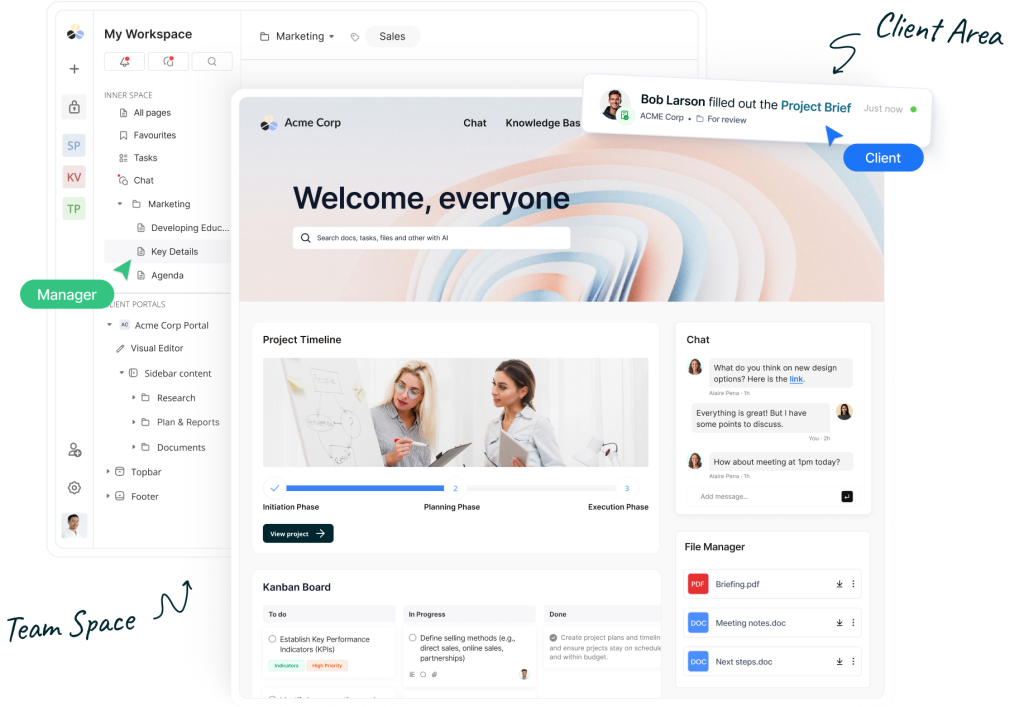
FuseBase is a versatile client portal and team collaboration platform designed for document management, task coordination, and process automation. Unlike traditional workspace tools, FuseBase offers a fully customizable portal experience, allowing businesses to centralize client interactions, track project progress, and integrate various content types—including text, files, tasks, and automated workflows—into a single interface. With built-in AI-powered search, automation, and e-signature capabilities, FuseBase is an excellent choice for teams that need flexible document workflows and structured collaboration beyond what Coda provides.
Pros:
- Highly customizable client and team portals
- Integrated AI-powered search and automation
- E-signature support for document approvals
- Secure document sharing with granular permissions
- Supports complex workflows and process views
Cons:
- Learning curve for advanced features
- No free plan, only a trial period available
- Fewer third-party integrations compared to Notion
Pricing:
- Starter: $9 per user per month
- Business: $19 per user per month
- Enterprise: Custom pricing based on company needs
2. SharePoint
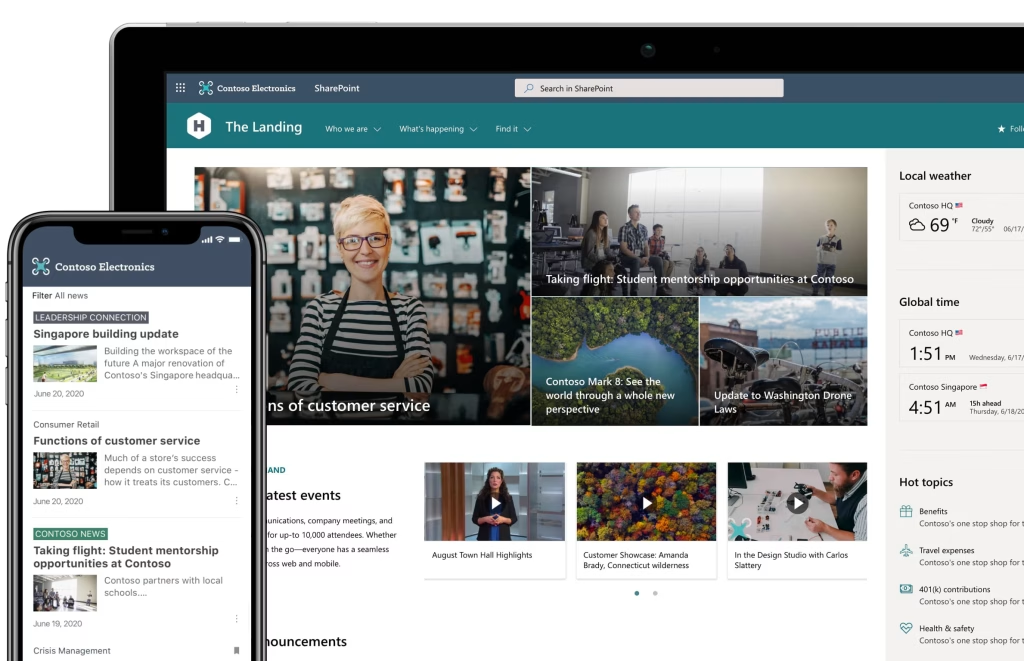
SharePoint is Microsoft’s enterprise content management and collaboration platform that enables businesses to create internal portals, manage documents, and automate workflows. Designed for large organizations, SharePoint offers robust security, permission controls, and deep integrations with Microsoft 365 apps like Word, Excel, and Teams. Compared to Coda, SharePoint is more scalable and security-focused, making it a top choice for enterprises that require centralized document control and compliance features.
Pros:
- Seamless integration with Microsoft 365 ecosystem
- Strong permission management and security features
- Supports enterprise-level document storage and automation
- Customizable team sites for collaboration
Cons:
- Requires Microsoft 365 subscription for full functionality
- Complex setup for non-technical users
- Can be expensive for small businesses
Pricing:
- SharePoint Online Plan 1: $5 per user per month
- SharePoint Online Plan 2: $10 per user per month
- Microsoft 365 Business Standard: $12.50 per user per month
- Microsoft 365 E3: $36 per user per month
3. Confluence
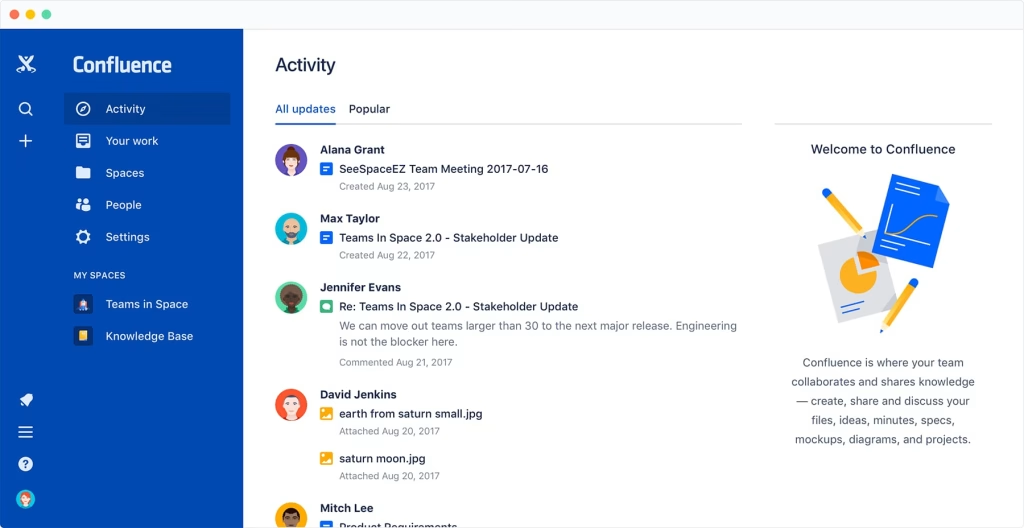
Confluence, developed by Atlassian, is a wiki-style documentation and knowledge-sharing platform built for teams that need structured content management. It excels in project documentation, team collaboration, and real-time editing, making it a strong alternative to Coda for organizations that need detailed knowledge bases or technical documentation repositories. Unlike Coda, Confluence is optimized for internal documentation and enterprise content organization, with powerful version tracking, access control, and integration with Jira.
Pros:
- Great for knowledge bases and team wikis
- Strong integration with Jira and other Atlassian products
- Extensive templates for structured documentation
- Advanced version history and access controls
Cons:
- Not as flexible for database-style workflows
- Can become cluttered with large documentation sets
- Advanced features require paid plans
Pricing:
- Free: Up to 10 users with limited features
- Standard: $5.75 per user per month
- Premium: $11 per user per month
- Enterprise: Custom pricing for large organizations
4. Notion
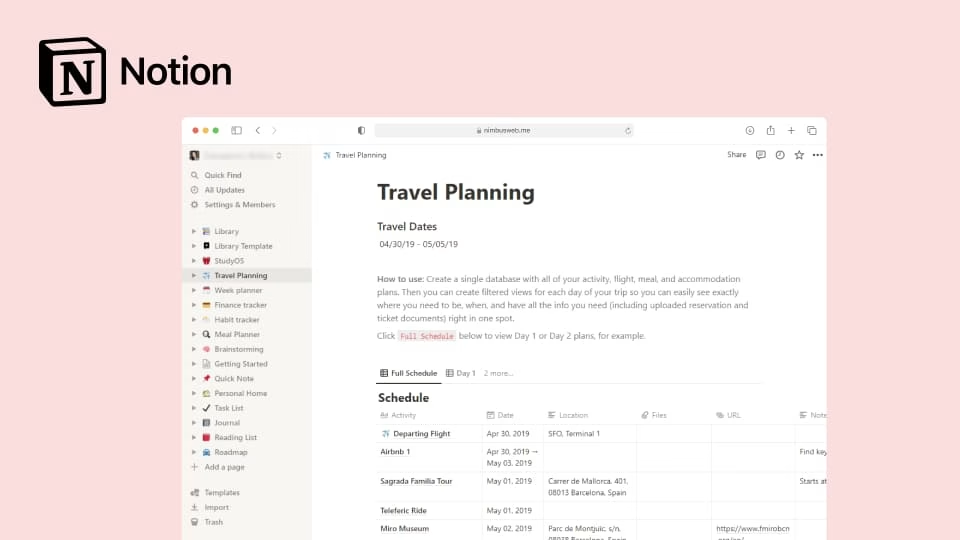
Notion is a flexible workspace tool that combines note-taking, database management, and document collaboration in one platform. Often considered a competitor to both Coda and Evernote, Notion allows teams to create structured knowledge bases, track tasks, and organize projects with drag-and-drop functionality. It is an excellent alternative for users who prefer a lightweight, highly customizable solution with strong visual organization features, though it lacks Coda’s advanced automation capabilities.
Pros:
- Intuitive interface with drag-and-drop functionality
- Easy-to-use databases and relational tables
- Highly customizable pages with embeds and formatting
- Free plan available with core features
Cons:
- Limited automation and integrations compared to Coda
- No offline access for team collaboration
- Can be overwhelming for new users due to flexibility
Pricing:
- Free: Basic features for personal use
- Plus: $8 per user per month
- Business: $15 per user per month
- Enterprise: Custom pricing for large-scale deployments
5. Google Docs
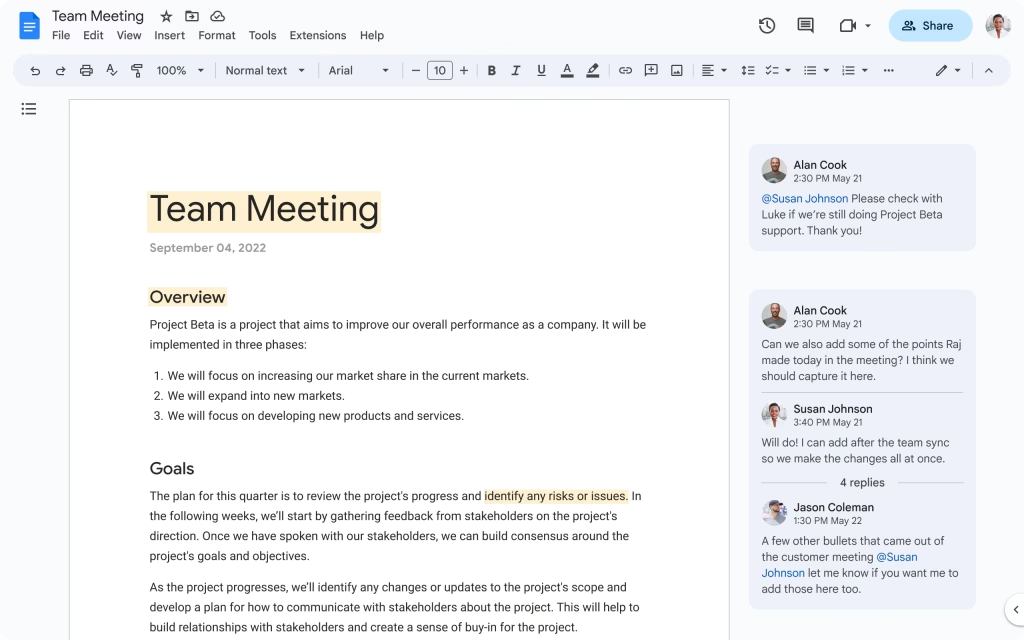
Google Docs is a simple yet powerful cloud-based document editor that enables real-time collaboration. While it doesn’t have Coda’s database features or automation capabilities, Google Docs is an excellent alternative for teams looking for fast, intuitive, and widely accessible document editing. It integrates seamlessly with Google Drive, Sheets, and Gmail, making it a preferred choice for users who prioritize ease of use and free access over advanced workflow management.
Pros:
- Free for individuals and small teams
- Seamless integration with Google Drive and other Google apps
- Real-time collaboration and commenting
- Simple and easy-to-use interface
Cons:
- No built-in automation or database functionality
- Limited formatting options compared to Notion or Coda
- Requires internet connection for most features
Pricing:
- Free: Available for individuals and small teams
- Google Workspace Business Starter: $6 per user per month
- Google Workspace Business Standard: $12 per user per month
- Google Workspace Business Plus: $18 per user per month
- Enterprise: Custom pricing based on company size and requirements
Choosing the Right Coda Alternative
Finding the best alternative to Coda depends on your team’s needs, workflow complexity, and budget. Each platform offers unique strengths:
- FuseBase is ideal for businesses that need customizable client portals, document automation, and AI-powered workflows.
- SharePoint is best for enterprises that require advanced document management, security controls, and Microsoft 365 integration.
- Confluence works well for teams managing internal documentation, wikis, and structured knowledge bases.
- Notion is great for lightweight project tracking, database-style organization, and highly customizable pages.
- Google Docs remains a simple, cost-effective solution for teams prioritizing fast, collaborative document editing.
Before making a decision, consider your team’s workflow, integration needs, and scalability requirements. If automation, advanced client interactions, and structured document management are priorities, FuseBase or SharePoint may be the best fit. For teams focusing on documentation and internal knowledge sharing, Confluence and Notion provide strong alternatives.
Evaluating free plans and trial options can also help you determine which tool aligns best with your needs. Whether you’re managing complex projects, client interactions, or internal documentation, selecting the right platform can significantly enhance productivity and collaboration.